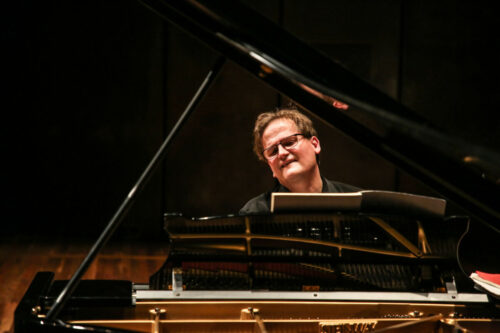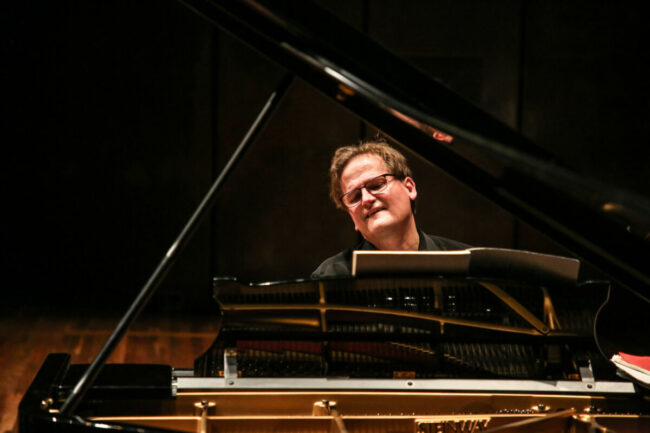 United Kingdom Prokofiev: Olli Mustonen (piano). Wigmore Hall, London, 1.11.2022. (JC)
United Kingdom Prokofiev: Olli Mustonen (piano). Wigmore Hall, London, 1.11.2022. (JC)

Prokofiev – Piano Sonata No.5; Piano Sonata No.8; Piano Sonata No.1; Piano Sonata No.3; Piano Sonata No.7
The last of the nine written as recently as three quarters of a century ago, Prokofiev’s piano sonatas are so often programmed in piano recitals nowadays that they have become consecrated into the canon despite their relatively young age. So often played are the three War Sonatas (Nos. 6, 7 and 8) in concerts and competitions that it is easy for us to neglect the other six (although No.3 is also rather popular and No.2 is making a comeback in recent years), also gems in their own right as well as testament to the inventive genius of Soviet Russia’s enfant terrible.
I was therefore very excited to see the Prokofiev sonatas performed as a cycle, even though I was only able to attend the second of the two nights over which Finnish pianist Olli Mustonen played the complete Prokofiev sonatas. Programmed individually, the pieces are adrenaline-filled showstoppers, heartrending laments and quirky pastiches; put together, they chart the composer’s musical life and display the diversity of his composing style, which ranges from the Neo-Romantic (No.1) to the experimental (No.5) to the borderline atonal (No.7).
Unfortunately, Olli Mustonen very much insisted on imposing his own distinctive performance idiom onto Prokofiev’s music, the result being that much of the musical substance in the score was left untouched, and I had the impression of a concert where each sonata blended with one another; by the end, Mustonen’s style of playing had become all too predictable, while nothing much of Prokofiev could be discerned.
The recital was nicely programmed; the first half married a tranquil and light-hearted Fifth Sonata with a rich and dramatic Eighth Sonata, while the second half was a virtuoso display, with the two one-movement sonatas (Nos. 1 and 3) paving the way for the manic and bombastic Seventh Sonata.
Despite the lightness of Mustonen’s left-hand accompaniment, there was little tranquillity in the Allegro tranquillo of Prokofiev’s Fifth Piano Sonata. Sustain pedal was only very sparsely used despite the obvious need for it, and Mustonen punctuated motifs and melodies in a manner much harsher than I would have liked, hammering certain keys according to his own whim, a style which I later came to realise was distinctly his. I would have liked longer melodic lines and a greater sense of the structure (Prokofiev, for all his erraticism, was at heart a classicist when it comes to form). Nevertheless, I did enjoy the second movement of the Sonata played in the style of Mustonen, which was very cheeky and rather provocative.
In the words of Sviatoslav Richter, one of the great performers of the Eighth Sonata: ‘Of all Prokofiev’s sonatas, this is the richest. It has a complex inner life, profound and full of contrasts.’ I found this ‘inner life’ and profundity lacking in Mustonen’s playing, where Prokofiev’s long lyrical melodies were once again punctured by accents that only served to break the flow of the music. The spontaneous liberties Mustonen took with time unfortunately only detracted from the richness of the music already present. It seemed to me as if he only wanted to use Prokofiev’s music as a canvas where he could add dabs of his own musical ideas here and there. The performance of the Eighth Sonata was too whimsical for my liking. Despite the big sound he was able to create at the piano, without a sense of the structure and any form of build-up, the wild finale of the Sonata only seemed to me a barrage of sound.
After the interval, I found a seat where I had a better view of Mustonen’s hands. By now, I had gotten used to his theatrics and dramatic gestures, which included raising the arms really high, air-conducting with free hands and wiggling them as if paying homage to Gergiev. He was everything the rigid, business-like Prokofiev was not, and his playing showed very much the same too.
The First Sonata was played with a dissatisfying lack of pedal, and there was none of the broad brushes of Romanticism still very much apparent in the youthful Prokofiev’s style, only Mustonen highlighting melodic motifs at the expense of all else.
There is no denying Mustonen’s technical abilities; the speed he took with some of the fast movements were above-average, to put it lightly. Nevertheless, I thought the manic pace of Mustonen’s playing worked well for the Third Sonata, which added a sense of anxiety to the pulsing quavers which pervade the entire Sonata. This nervous, slightly unhinged way of playing, created by the subito pianos and the accents under Mustonen’s fingers, was even more effective in the opening of the Seventh Sonata, marked Allegro inquieto. However, when it came to the expressive second subject, Mustonen insisted on playing it his own way, and the music simply came out too harsh and abrupt.
The Precipitato movement, which acted as both the finale of the Seventh Sonata and the finale to Mustonen’s Prokofiev sonata cycle, is known for the excitement it induces, both in the audience and the performer. So popular is it that it is often taken out of its context and used as encores or performed as a demonstration of one’s virtuosity in such a way that one would have thought Prokofiev had marked Presto instead of Precipitato. Still, I have never heard this movement played as fast as Mustonen played it tonight, so fast everything was a blur apart from the accents. It is therefore with an ironic tone that the programme notes announce that the third and final movement of the sonata, ‘when played very fast and very loud…can sound hollow and bombastic.’ In the final two pages, which are horrendously difficult to execute, Mustonen, in his mania, even upped the ante so that the music turned into a cascade of wrong notes that bore resemblance to the score only in its adherence to the rhythm. Sure, it is impressive to see a performer’s hands move so fast over the keyboard, but this movement is so much more than that.
For me, this concert was only a display of Olli Mustonen’s own performance idiom, and a lot of what I had hoped to hear in Prokofiev’s music I unfortunately did not get a chance to hear. A rather disappointing Prokofiev sonata cycle and sadly not one for the books.
Jeremy Chan

I sort of agree with your critique of OM handling of lyrical passages but it was very exciting and intense playing all the same. Compelling yet wrong. He doesn’t let melody breathe. He is too bossy and pointed with it.
What recording do you particularly enjoy?
Thanks for your reply Paul! Yes, intense and exciting I do agree, but then his style got too predictable for my taste.
Richter all the way when it comes to Prokofiev! I also enjoy Freddy Kempf and Sokolov’s performances.